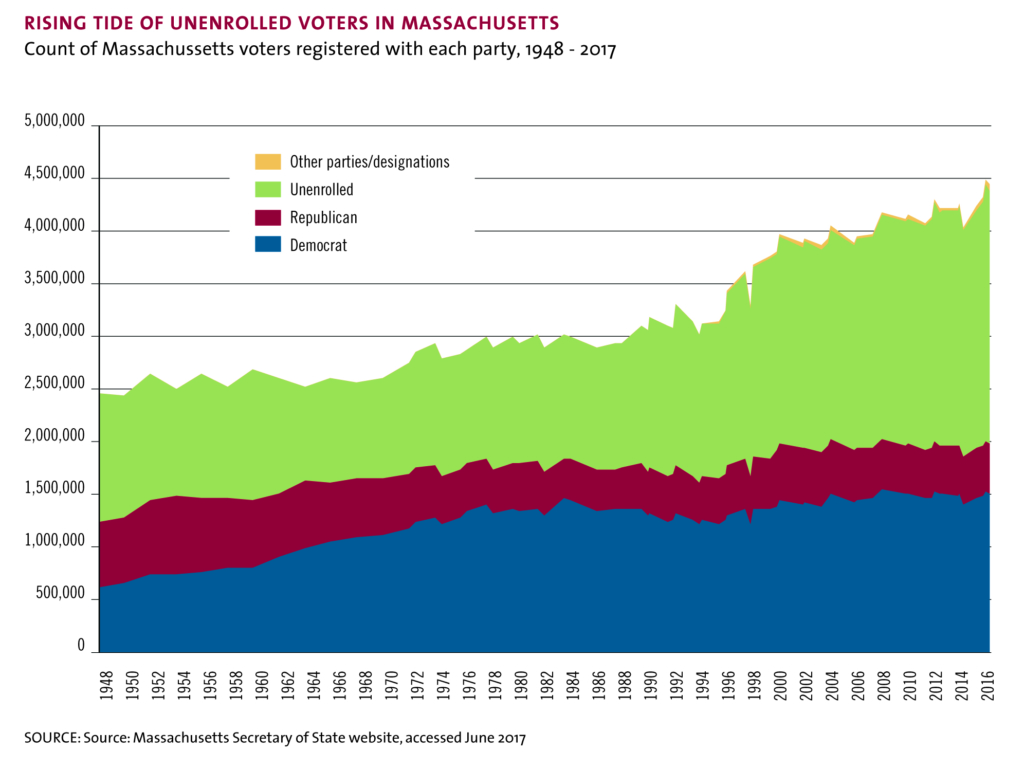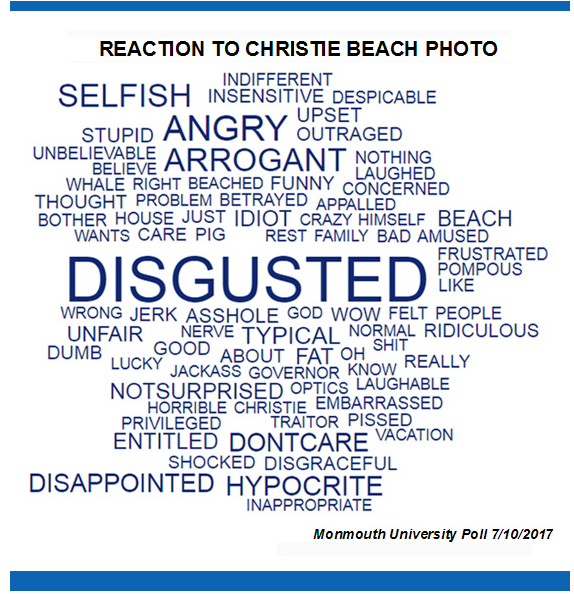Party leaders, consultants look for ways to win on new landscape
The ranks of political independents continue to swell in Massachusetts, while the number of Democrats and Republicans remains roughly steady. Younger voters are choosing to remain “unenrolled” when they register to vote, rather than choosing a political party. The result is an increasing tilt toward the “unenrolled,” as they are called here, who now make up 55 percent of the state’s voter rolls. We looked at the numbers in “It’s not my party, but I’ll vote if I want to,” appearing in the new summer issue of CommonWealth.

Key people within the two major parties reacted with mostly ambivalence about the direction of the trend, largely focusing on the practical realities of winning in a state with fewer registered partisans. Both parties were quick to point out that campaigns have plenty of data other than party registration, allowing them to identify likely supporters.
“The MassGOP has invested heavily in data tools that allow Republican candidates to target voters and build winning coalitions using information that extends well beyond partisan identification,” said Terry MacCormack, a spokesman for the state Republican Party.
Robert Cohen, vice president of the Young Democrats of Massachusetts, also minimized the importance of a decline in party registration. “I don’t see it as an extreme problem,” he said. “I’ve seen people come out and support a candidate or work for a campaign, but be unenrolled. Whatever might in the past have pushed them towards a party now pushed them towards a set candidate.”
And when campaigns get underway, wishing for different numbers won’t change anything. “It’s the state of the world in which we live, and we will continue to make do with the facts in the world as they are,” said Jay Cincotti, a Democratic consultant who recently served a stint as executive director of the Massachusetts Democratic Party. “My job as a campaign operative is to win a race in that moment. Gnashing my teeth about the decline in partisanship doesn’t help me win that race.”
Benjamin Rajadurai, chairman of the Massachusetts Alliance of College Republicans, sees the rise of unenrolled voters as an opportunity for his party. “It helps us in Massachusetts,” he said. “Voters don’t need to identify with a party, but with a specific candidate. Even if they’re not enrolled, we can identify them. It’s not just about party ID. It’s about values and issues.”
A rise in truly non-partisan voters would likely be helpful to the Massachusetts GOP, given the Democrats’ advantage in party registration and self-identification. But the rise in unenrolled voters only means fewer are formally aligned with a party. Even unenrolled voters and who call themselves independents in a poll will reveal a partisan leaning when pressed, a point Cohen underscores. “We all know the trend has been ongoing, but people who are independent but lean generally vote the same way as people who are strictly partisan,” he said.
The exceptions to partisan voting habits are important, and have given the Republican Party a firm grip on the governorship since 1991, interrupted only by Deval Patrick. Other than in the corner office, the increase in unenrolled voters has brought little change to the party composition of the state’s elected officials.
Even so, Rajadurai remains hopeful that personality can overcome party leanings with younger voters moving forward. “Go into any classroom, you’ll see people on either side of the aisle, and they’re unenrolled,” he said. “I think if we’ve seen anything in the past few years, voters are fed up with the status quo, they think the system is broken. I think the party that can see this and capitalize on this will win, and continue to win.”
Massachusetts will be treated to a field experiment in the independence of independents in 2018, as the popular leaders of both parties seek reelection. Both will run up huge majorities in their own party, and will look to unenrolled voters to help carry them to victory. Sen. Elizabeth Warren can rely more on Democrats’ 3-to-1 advantage in voter registration, and just needs to keep the margin among independents from getting too wide. Gov. Charlie Baker has said he is targeting 60 percent of independents, as well as a healthy share of Democrats.
The upshot? If both Baker and Warren win reelection, it will be because some sizeable share of independents split their tickets, voting for the Democrat for Senate and the Republican for governor. You can chalk some of that up to the power of incumbency, but it will also show that a consequential slice of independents are not partisans in disguise but really are, as Cohen and Rajadurai assert, voting for the candidate and not the party.
-Steve Koczela and Hannah Chanatry
This article was also published on CommonWealth Magazine.
MPG ICYMI
WBUR poll: Massachusetts voters concerns about climate change have increased sharply over the last few years.
WBUR poll: Governor Charlie Baker and Senator Elizabeth Warren both start strong, heading into their reelection campaigns.
MPG President Steve Koczela looks at the impact of both an income tax hike and a sales tax rollback both potentially making the 2018 ballot.
THE CROSSTABS
The Gallup daily tracker shows Trump at 40 percent job approval, with 55 percent disapproving, edging up slightly after coming close to all time lows. FiveThirtyEight (39-55) and Huffpollster (41-56) show similar figures.
Trump is doing less well globally. Just 22 percent of respondents to Pew’s 2017 Global Attitudes Survey have at least some confidence in Trump, up slightly from before he took office. In every country surveyed except Israel and Russia, views of Trump were more negative than President Obama at the end of his term.
Recent revelations about Russia haven’t changed many people’s minds about Trump, per polling from the Huffington Post. But these aren’t the most recent revelations, a perennial challenge facing pollsters in this era of the hourly news cycle.
Back in the states, Pew’s Center for People and the Press found sharp partisan splits in views of major institutions, including the media and higher education.
New Jersey Governor Chris Christie has a 15 percent approval rating, in a poll conducted after “Beachgate”. That’s almost a record low for a sitting governor.
Come for the job approval, stay for the word cloud about Christie’s July 4th beach outing.

The Senate health care plan, is just as unpopular as the bill that passed the House. Huffpollster rounded up the polling.
Finally, SSRS surveyed Americans on their favorite ice cream habits: flavors, toppings, cup versus cone. A majority (55 percent) of you like ice cream in a bowl. Seriously. We at MPG are in the cone minority. Don’t @ us.
– – – – – – – – – – – – Nerd Alert Tearline – – – – – – – – – – – –
Steve found a conference even nerdier than AAPOR, and is headed to Marrakesh for the World Statistics Congress. He’ll be presenting “A systems thinking approach to addressing survey data fabrication,” a new angle on an issue he has written about in the past. Don’t hide your FOMO, we know.
